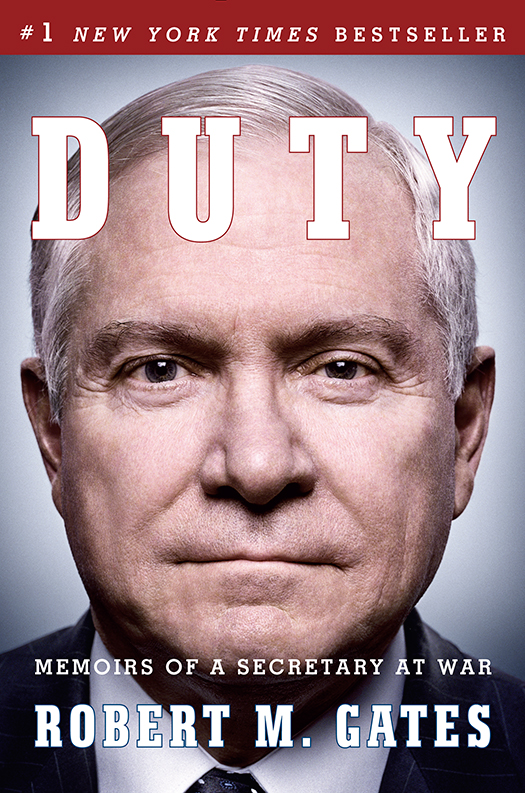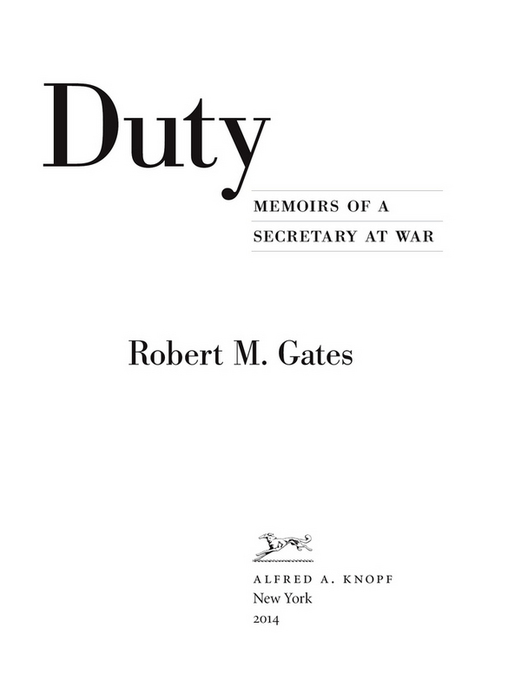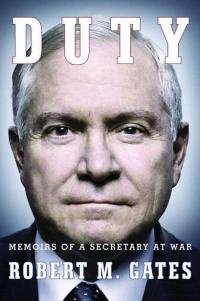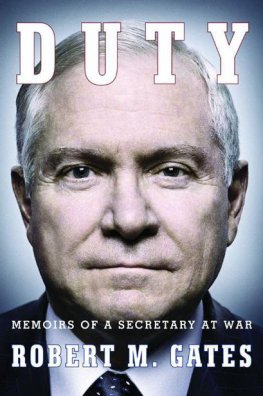Gates - Duty: memoirs of a Secretary at war
Here you can read online Gates - Duty: memoirs of a Secretary at war full text of the book (entire story) in english for free. Download pdf and epub, get meaning, cover and reviews about this ebook. City: Iraq;United States, year: 2014, publisher: Knopf Doubleday Publishing Group, genre: Politics. Description of the work, (preface) as well as reviews are available. Best literature library LitArk.com created for fans of good reading and offers a wide selection of genres:
Romance novel
Science fiction
Adventure
Detective
Science
History
Home and family
Prose
Art
Politics
Computer
Non-fiction
Religion
Business
Children
Humor
Choose a favorite category and find really read worthwhile books. Enjoy immersion in the world of imagination, feel the emotions of the characters or learn something new for yourself, make an fascinating discovery.

- Book:Duty: memoirs of a Secretary at war
- Author:
- Publisher:Knopf Doubleday Publishing Group
- Genre:
- Year:2014
- City:Iraq;United States
- Rating:4 / 5
- Favourites:Add to favourites
- Your mark:
- 80
- 1
- 2
- 3
- 4
- 5
Duty: memoirs of a Secretary at war: summary, description and annotation
We offer to read an annotation, description, summary or preface (depends on what the author of the book "Duty: memoirs of a Secretary at war" wrote himself). If you haven't found the necessary information about the book — write in the comments, we will try to find it.
Duty: memoirs of a Secretary at war — read online for free the complete book (whole text) full work
Below is the text of the book, divided by pages. System saving the place of the last page read, allows you to conveniently read the book "Duty: memoirs of a Secretary at war" online for free, without having to search again every time where you left off. Put a bookmark, and you can go to the page where you finished reading at any time.
Font size:
Interval:
Bookmark:


THIS IS A BORZOI BOOK
PUBLISHED BY ALFRED A. KNOPF
Copyright 2014 by Robert M. Gates
All rights reserved. Published in the United States by Alfred A. Knopf, a division of Random House LLC, New York, and in Canada by Random House of Canada Limited, Toronto, Penguin Random House Companies.
www.aaknopf.com
Knopf, Borzoi Books, and the colophon are registered trademarks of Random House LLC.
Library of Congress Cataloging-in-Publication Data
Gates, Robert Michael, [date]
Duty : memoirs of a Secretary at war / by Robert M. Gates.
pages cm
ISBN 978-0-307-95947-8 (hardcover) ISBN 978-0-307-95948-5 (eBook)
1. Gates, Robert Michael, 1943 2. United States. Department of DefenseOfficials and employeesBiography. 3. Cabinet officersUnited StatesBiography. 4. Iraq War, 20032011Personal narratives. 5. Afghan War, 2001Personal narratives, American. 6. War on Terrorism, 20012009Personal narratives, American. 7. United StatesMilitary policyDecision making. 8. Civil-military relationsUnited StatesHistory21st century. 9. United StatesPolitics and government20012009. 10. United StatesPolitics and government2009 I. Title. II. Title: Memoirs of a Secretary at war.
E897.4P48B76 2012
355.6092dc23 [B] 2013026348
Front cover photograph by Platon
Cover design by Chip Kidd
v3.1_r5
This book is dedicated to the men and women of the United States Armed Forces.
This is a book about my more than four and a half years at war. It is, of course, principally about the wars in Iraq and Afghanistan, where initial victories in both countries were squandered by mistakes, shortsightedness, and conflict in the field as well as in Washington, leading to long, brutal campaigns to avert strategic defeat. It is about the war against al Qaeda and Osama bin Laden, those responsible for our national tragedy on September 11, 2001. But this book is also about my political war with Congress every day I was in office and the dramatic contrast between my public respect, bipartisanship, and calm, and my private frustration, disgust, and anger. There were also political wars with the White House, often with the White House staff, occasionally with the presidents themselvesmore with President Obama than with President Bush. And finally, there was my bureaucratic war with the Department of Defense and the military services, aimed at transforming a department organized to plan for war into one that could wage war, changing the military forces we had into the military forces we needed to succeed.
George W. Bush and Barack Obama were, respectively, the seventh and eighth presidents I worked for. I knew neither man when I began working for them, and they did not know me. To my astonishment (and consternation), I became the only secretary of defense in history to be asked to remain in the position by a newly elected president, let alone one of a different party. I came to the job in mid-December 2006 with the sole purpose of doing what I could to salvage the mission in Iraq from disaster. I had no idea how to do it, nor any idea of the sweeping changes I would need to make at the Pentagon to get it done. And I had no idea how dramatically and how far my mission over time would expand beyond Iraq.
As I look back, there is a parallel theme to my four and a half years at war: love. By that I mean the lovethere is no other word for itI came to feel for the troops, and the overwhelming sense of personal responsibility I developed for them. So much so that it would shape some of my most significant decisions and positions. Toward the end of my time in office, I could barely speak to them or about them without being overcome with emotion. Early in my fifth year, I came to believe my determination to protect themin the wars we were in and from new warswas clouding my judgment and diminishing my usefulness to the president, and thus it played a part in my decision to retire.
I make no pretense that this book is a complete, much less definitive, history of the period from 2006 to 2011. It is simply my personal story about being secretary of defense during those turbulent, difficult years.
I had become president of Texas A&M University in August 2002, and by October 2006 I was well into my fifth year. I was very happy there, and manybut not allAggies believed I was making significant improvements in nearly all aspects of the university (except football). I had originally committed to staying five years but agreed to extend that to seven yearssummer 2009. Then my wife, Becky, and I would finally return to our home in the Pacific Northwest.
The week of October 15, 2006, the week that would change my life, started out routinely with several meetings. Then I took to the road, ending up in Des Moines, Iowa, where I was to give a speech on Friday, the twentieth.
Just past one p.m. that day I received an e-mail from my secretary, Sandy Crawford, saying that President Bushs national security adviser, Steve Hadley, wanted to speak to me on the phone within an hour or two. Hadleys assistant was quite insistent that the message be passed to me. I told Sandy to inform the assistant I would return Steves call on Saturday morning. I had no idea why Steve was calling, but I had spent nearly nine years at the White House on the National Security Council (NSC) staff under four presidents, and I knew that the West Wing often demanded instant responses that were rarely necessary.
Hadley and I had first met on the NSC staff in the summer of 1974 and had remained friends, though we were in contact infrequently. In January 2005, Stevewho had succeeded Condoleezza Rice as George W. Bushs national security adviser for the second Bush termhad asked me to consider becoming the first director of national intelligence (DNI), a job created by legislation the previous year, legislationand a jobthat I had vigorously opposed as unworkable. The president and his senior advisers wanted me to make it work. I met with Hadley and White House chief of staff Andy Card in Washington on Monday of inauguration week. We had very detailed conversations about authorities and presidential empowerment of the DNI, and by the weekend they and I both thought I would agree to take the job.
I was to call Card at Camp David with my final answer the following Monday. Over the weekend I wrestled with the decision. On Saturday night, lying awake in bed, I told Becky she could make this decision really easy for me; I knew how much she loved being at Texas A&M, and all she had to say was that she didnt want to return to Washington, D.C. Instead, she said, We have to do what you have to do. I said, Thanks a lot.
Late Sunday night I walked around the campus smoking a cigar. As I walked past familiar landmarks and buildings, I decided I could not leave Texas A&M; there was still too much I wanted to accomplish there. And I really, really did not want to go back into government. I called Andy the next morning and told him to tell the president I would not take the job. He seemed stunned. He must have felt that I had led them on, which I regretted, but it really had been a last-minute decision. There was one consolation. I told Becky, We are safe nowthe Bush administration will never ask me to do another thing. I was wrong.
At nine a.m. on Saturdaynow nearly two years laterI returned Steves call as promised. He wasted no time in posing a simple, direct question: If the president asked you to become secretary of defense, would you accept? Stunned, I gave him an equally simple, direct answer without hesitation: We have kids dying in two wars. If the president thinks I can help, I have no choice but to say yes. Its my duty. The troops out there were doing their dutyhow could I not do mine?
Font size:
Interval:
Bookmark:
Similar books «Duty: memoirs of a Secretary at war»
Look at similar books to Duty: memoirs of a Secretary at war. We have selected literature similar in name and meaning in the hope of providing readers with more options to find new, interesting, not yet read works.
Discussion, reviews of the book Duty: memoirs of a Secretary at war and just readers' own opinions. Leave your comments, write what you think about the work, its meaning or the main characters. Specify what exactly you liked and what you didn't like, and why you think so.














